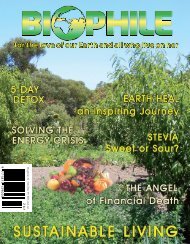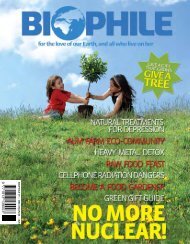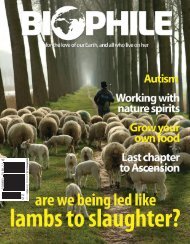BIOPHILE 16 â JUNE/JULY 2007 R25 - Biophile Magazine
BIOPHILE 16 â JUNE/JULY 2007 R25 - Biophile Magazine
BIOPHILE 16 â JUNE/JULY 2007 R25 - Biophile Magazine
- No tags were found...
You also want an ePaper? Increase the reach of your titles
YUMPU automatically turns print PDFs into web optimized ePapers that Google loves.
Windmill, FindhornGEM:The GlobalEcovillageMovementby Yan(Khula DhammaEcovillage, Eastern Cape)“When you are inspired by somegreat purpose, some extraordinaryproject, all your thoughts breaktheir bonds, your mind transcendsall limitations, your consciousnessexpands in all directions and youfind yourself in a new great andwonderful world!”PatanjaliImagine if you will, a village wherepeople of all ages live together inharmony. Where diversity is celebratedand all villagers devote their goodwill,intelligence, capital and labour tomeet the common goals of caringfor the Earth, to live a peaceful andmeaningful existence while honouringand nurturing all life-systems. Whereall villagers support and care foreach other; where children are giventhe freedom, guidance and relevanteducation to reach their full potential;where each individual has a voicein decisions that affect them; whereconflicts are resolved peacefully; wherea constructive and rewarding livelihoodcan be gained without sacrificing timefor family, friends, play, creativity,bonding and connecting with nature;where, aside from bartering certaingoods with other villages, they arecompletely self-sufficient. They growtheir own food without harming theEarth, build their own dwellings withnatural and local materials, generatetheir own electricity, and turn their ownwaste into nutriment for the land.If you think it sounds a bit like a Utopianfantasy, you’re probably not alone.It’s ironic that despite the fact that sucha place appeals to and touches most ofus on a very deep level, there are veryfew of us who dare to dream about it,and perhaps even less who believe itcan actually be achieved. Now what if,by choosing to live this way, you concurrentlytackle and overcome many (andperhaps, in time, ALL) of the problemsand suffering that humanity andthe Earth are currently facing, whilesignificantly improving your quality oflife? You’d probably wonder what you’rewaiting for!“Paradoxically, things are gettingworse and better at the sametime, although the worse is moreapparent because it makes somuch ‘noise’.”Eckhart TolleIn the last decade or so aquiet revolution has been gainingstrong momentum, quiteoverlooked by the media andgovernment bodies.It is called the Global EcovillageMovement (you might say“GEM”) and has been hailed as‘the most important movementin human history’.The type of village describedabove is a possible example ofwhat has come to be known as anecovillage. Succinctly speaking anecovillage is an intentional community,where all are committedto living in harmony with natureand with each other. The definitiongiven by the Fellowship forIntentional Community is “A groupof people who have chosen to livetogether with a common purpose,working cooperatively to create alifestyle that reflects their sharedcore values.” An ecovillage generallysupports between 30-500 residents andcan vary from a small tribe of Stone Agefruitarians (Terramana, Indonesia) toan extensive, high-tech internationalcommunity with over 1500 inhabitants(Auroville, India).The GEM is a global phenomenonresponding to global causes. Whileecovillages are an integral part of theanti-globalisation movement, ratherthan protesting and boycotting thecorporate-political self-interest, thepioneers behind them are gently creatingsmall sustainable communities withtheir limited resources and relentlesscommitment- walking their talk.“Do not be afraid to build castles inthe sky.That is where they belong.But once the dreams are in place,Your job is to build the foundationunder them.”Henry David ThoreauThe few, more established ecovillagessuch as Findhorn (Scotland, est. 1962),The Farm (USA, est. 1971) and CrystalWaters (Australia, est. 1987) havebecome such focal points of an internationallygrowing interest that theyare continually running courses andworkshops. Perhaps their steep attendancefees are also a means of keepingthe hordes at bay!Intentional community is certainlynothing new. Native tribal villagesand religious communities, with a commonthread of self-reliance and spiritualreverence, have existed for millennia.Interestingly, the traditional ruralvillages of the South tend to grasp therevolutionary potential of ecovillagesmuch quicker than those from the modernsociety. Since their social fabric andconnection to Nature have remainedrelatively intact, they often recognisethe ecovillage-model as complementaryand enhancing to their village-basedculture. Deplorably, many such villagesare continually threatened, exploitedand destroyed through commercial globalisationas the currently dominatingquasi-liberal economic system remainscompletely unaccountable for theinestimable social and environmentaldevastation left in its tyrannical, toxicwake.Meanwhile, in the North, manypeople are awakening to our shallow,careless and isolated existence thathas become so fragmented and disconnectedthrough spending negligibletime in the wild; through separation ofwork and home; separation of rich and20 <strong>Biophile</strong> Issue <strong>16</strong>
















